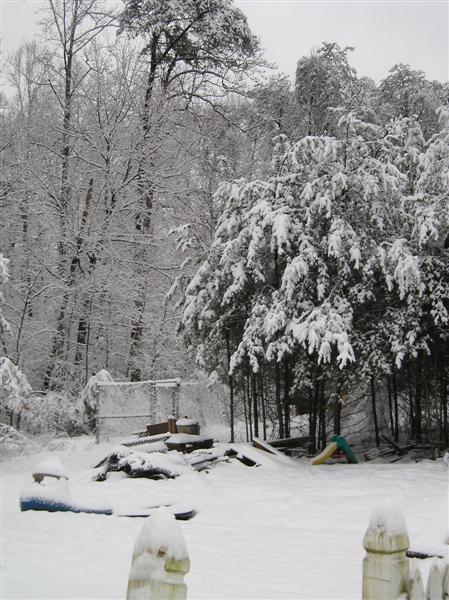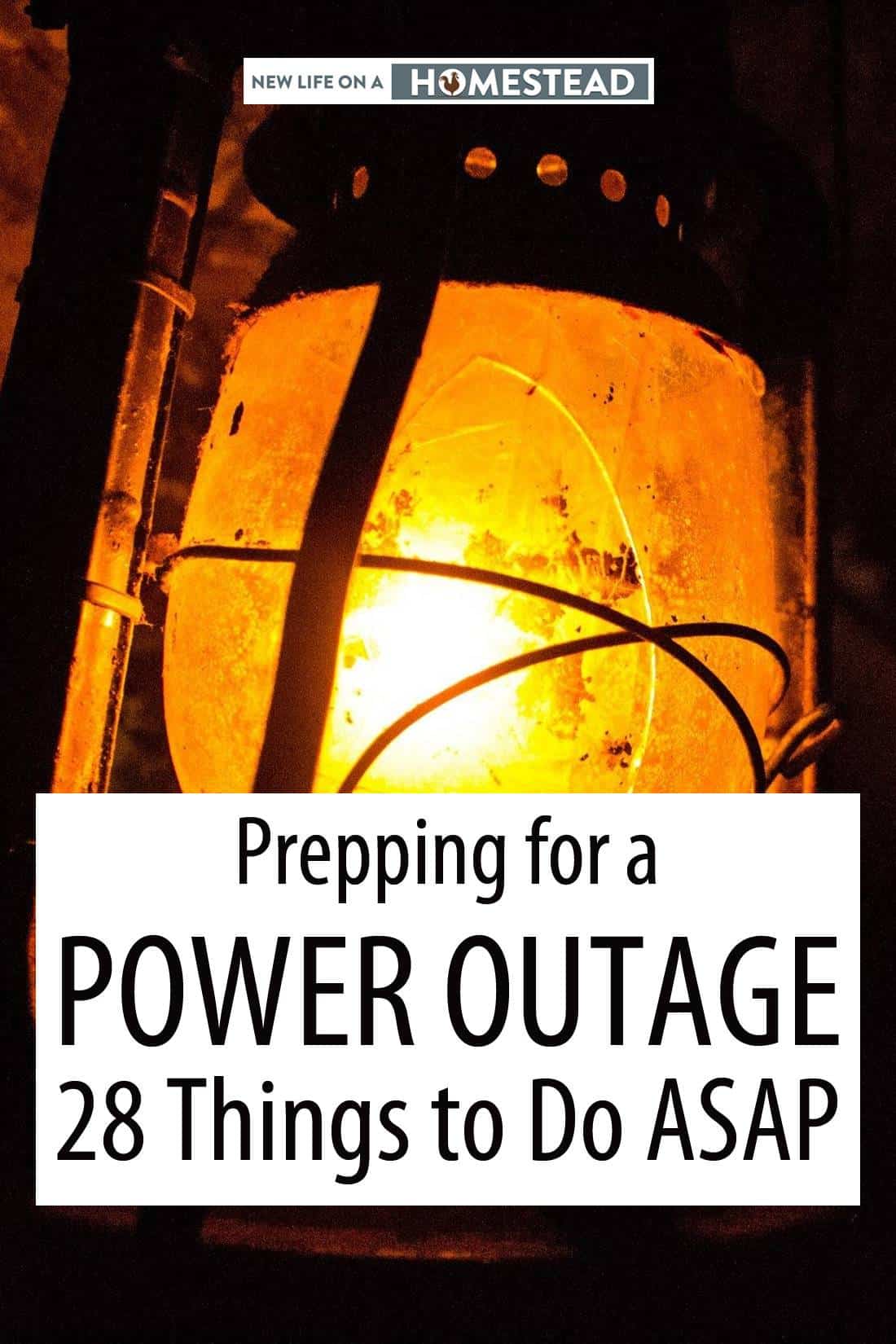Last night we got slammed with yet another snowstorm. When we woke up this morning, this was the scene out the backdoor:

The kids yard toys, a pile of wood scraps… everything covered! Way in the back there is the goat/pig pen. The two of them are snuggled together warm in their house.
And the puppy… she thoroughly enjoyed being able to sleep in the warmth of the laundry room on a bed of old t-shirts.
If you want to be prepared for anything Mother Nature throws your way, it is a good idea to prepare yourself ahead of time for a power outage.
In this article, I’ll walk you through some simple steps – note that these are designed for short term outages and not blackouts, but many of the same recommendations apply to both scenarios.
Be prepared for anything by following these simple tips.
28 Things to Do to Prepare for a Power Outage
When it comes to preparing for a power outage, it’s important to remember that a loss of electricity can impact you in a number of ways. It can cause a disruption to water, transportation, and communications. It can close grocery stores, gas stations, and other services.
Most significantly, it can impact food storage and water sterilization or even prevent the use of medical devices.
Because of this, it’s important to prepare ahead of time so that your family stays healthy and comfortable should you lose electricity.
Disclosure: if you visit an external link in this post and make a purchase, I may earn a commission. Read my full earnings disclosure here.
1. Invest in Light Sources
When the power goes out, so do the lights – obviously! Make sure you have plenty of flashlights, batteries, LED lights, or solar lanterns on hand. Even candles work well in a power outage – but there is the obvious fire hazard to consider. Keep flashlights on hand, too, so you’ll be able to see no matter what.
2. Where Will You Cook?
If you have a wood stove or a gas stove, then a power outage won’t cause you any serious stress in this area – you have a place to cook food and boil water, if needed.
However, you might need to consider an alternative if your oven is electric. Find a space outside where you can set up a generator, charcoal grill, or camp stove.
If you plan on using these sorts of cooking devices, it’s imperative that you have a spot outside to do so. Do not use them indoors, as this can lead to carbon monoxide poisoning. Keep these appliances at least 20 feet from any windows.
3. Check On Your Generator
Especially if it has been a while since you last used it, make sure your generator is in good working order. Be sure you have fuel on hand to power it and double-check that it runs and is properly maintained.
4. Buy Some Coolers
When the power goes out, your food is going to spoil much faster. It can help to keep the refrigerator and freezer doors shut, but the refrigerator will only keep food cold for about four hours until it starts to heat up.
It’s a good idea to have a few coolers on hand that you can fill with ice cubes should the power go out in the middle of the summer.
And if your food does end up being exposed to temperatures above 40 degrees for more than two hours, throw it out. It’s not worth the food poisoning.
5. Stock Up on First Aid Supplies
Make sure you have all the first aid supplies you might need, including bandages, antibiotic ointment, ibuprofen, and other gear. Prescription and OTC medications should be kept in stock, too – keep a few extra on hand just in case.
Make a backup plan for medications that require refrigeration – this is something you don’t have to worry about if the power goes out. The same goes for any medical devices that require power, like sleep apnea (CPAP) machines or ventilators.
6. Know Where to Report the Outage
In most cases, power companies know when the grid is down – and they’re already working to fix things by the time you get around to reporting it. However, there are situations in which a power outage could affect just your household, especially if you live on an isolated rural road.
Know to whom you should report the power outage and when – that way, the utility companies can get to work fixing it as soon as possible.
7. Make a Disaster Kit
No matter what the emergency might be, it’s a good idea to have a disaster kit on hand. A power outage certainly counts as an emergency! Have enough water (at least a gallon per person per day for three days at a minimum), a three-day supply of non-perishable food, and things like flashlights, manual can openers, and batteries.
8. Buy and Prepare Shelf-Stable Foods
Have at least a one-week supply of food on hand – and by that, I mean food that does not need to be frozen or refrigerated. Canned and dry goods are key, ideally those that can be prepared without the need for cooking. This will help you feed your family even if the power goes out and the roads become impassable.
9. Keep Cash On Hand
Ideally, you should make sure you have everything you need on site in the event of a power outage so you don’t need to leave.
But you never know when a power outage will force you out into public – and remember, if you don’t have power, gas stations and other facilities might not have electricity to run your credit card, either. Keep a few hundred dollars’ worth of cash on hand – you never know when you might need it.
10. Invest in Portable Chargers
Invest in a few battery banks and make sure they’re kept fully charged. That way, you’ll be able to use your cell phone and other electronic devices in a power outage.
11. Make Ice Ahead of Time
It might seem silly to think you’ll need ice in the middle of a winter storm – but remember, power outages can happen for a variety of reasons. Ice will be essential when it comes to keeping food in your freezer cold during a power outage.
Freeze containers of water ahead of time. Keep these in the freezer. Although they will eventually begin to melt, too, it’s more frozen space that will help keep your food frozen in the meantime.
12. Set the Refrigerator and Freezer to the Coldest Settings Possible
If you expect that a power outage might occur, consider setting your appliances to the coldest possible setting. This isn’t a great rule to follow for general, regular-day living, since it can cause food to become freezer burned or food in the refrigerator to freeze.
However, if you know the power is likely to go out, making sure things are as cold as possible before you lose power can help prolong their shelf life once you lose power.
13. Have Backup Keys
In the past, this wasn’t a major concern – but now, in our increasingly digitized day and age, more and more appliances and utilities are operated with electronic locks and keys. These need power to operate. Do some research to find out if you can use backup keys that don’t require electricity to run.
14. Buy Crank Radios
Have a few battery-powered or crank radios on hand. That way, you can stay informed when the power goes out. This is something that’s vital, even if the outage will only last a few hours.
Radios will let you know what’s going on weather-wise, as well as if the emergency is severe enough to necessitate an evacuation.
15. Print Out Any Important Documents
Best case scenario, a power outage lasts a couple of hours and everybody is safe and comfortable. Worst case, someone gets hurt and you need to reach a doctor or another emergency service. Print off any documents you might need, including emergency phone numbers or medical paperwork.
16. Don’t Neglect Pets and Livestock
If you have animals, it’s important to consider their needs in a power outage, too. Keep plenty of food and water on hand for both. If you rely on lights or things like water heaters to keep your animals taken care of, you may want to consider alternatives if the power goes out.
17. Staying Cool When the Power is Out
Keep a few battery-powered fans on hand in case the power goes out in the summer – and the AC along with it! That way, you’ll be comfortable no matter what.
18. Find Ways to Occupy Your Mind
One of the biggest issues that goes along with a power outage – and one that few people actually account for – is how they will entertain themselves when the power is out so they don’t go stir crazy! Have cards, books, and board games on hand so that you can stay comfortable and happy when there’s no electricity.
19. Prepping for Cold Weather Outages
The power can go out at any time – even in the dead of winter, which is something I know all too well!
Make sure you have quality sleeping bags and emergency thermal blankets on hand. That way, you can stay warm even if you don’t have any heat.
Better yet? Invest in a woodstove or outdoor wood boiler and make sure you always have firewood ready to go. You’re outage-proof!
20. Take Advantage of the Time Before the Outage
If you expect that the power might go out, take advantage of this time when you do have electricity. Make sure all the laundry is washed, dried, and put away.
Run the dishwasher – but make sure you have paper plates and utensils on hand to eat with in the meantime. Vacuum and mop the flowers. With advanced warning, you can take advantage of the electricity you have before you lose it.
21. Have an Emergency Plan
Sit down with your family and make sure everyone knows where to go when there’s an evacuation or what needs to be done in the event of a power outage. Make sure the plan is clear to everyone, especially young children.
22. Bake Some Snacks Ahead of Time
Again, if you know that the power is going to go out, it’s a good idea to get your cooking and baking done ahead of time. Bake and cook some foods that ideally don’t require any refrigeration for a few days – muffins and cookies would work great!
23. Stock Up on Clean Water
Fill a few containers with clean water. Wash the bathtub out and fill it with water, too (unless you have young children, for whom this might prove to be a drowning hazard). The bathtub water will be a great resource for flushing the toilet and bathing – I wouldn’t necessarily recommend it for drinking water.
On a side note, consider whether there are ways you can purify the water you have just in case. In severe outages and emergencies, water might not be safe to drink without purifying it first.
24. Charge Everything
All of your electricity-powered devices need to be fully charged and ready to go. Everything from radios, cell phones, laptops, tablets, battery banks – make sure it all has full juice!
25. Water Plants
Water any houseplants that need to be irrigated before the power goes out, which will make it more challenging (or impossible!) to do so.
26. Consider Your Home Security
What sorts of security systems do you have in place in your home? It might be a good idea to consider an upgrade. Security lighting should not be dependent on electricity. Instead, consider installing physical barriers like security doors.
27. Buy a Food Thermometer
I think I’ve already droned on enough about food safety and keeping things cold during a power outage – but have you put any thought into how you’ll know whether the food you have is safe to eat?
You can always eyeball it or “guesstimate” but unfortunately, it’s often tough to tell if food is in the danger zone. Keep a food thermometer on hand so you can know for sure.
28. Check On Your Neighbors
Last but not least, remember that it’s not just you and your family that you need to be looking out for during a power outage – it’s also your community. Check up on your neighbors during a power outage to make sure they are safe and cared for, especially if your neighbors are elderly or infirm in any way.
Create a support network, identifying people who can help you evacuate or stay at home comfortably during a power outage. Have a list of people that need to be contacted in the event of such an emergency and keep a paper copy of the contact list.
Be Prepared for Anything!
With the ice/snow mix still coming down hard, we are expecting our power to go out at any moment. All morning we’ve been busy preparing for the loss of electricity. Without a generator, this would mean no heater and no running water.
We are fortunate to have a wood burning fireplace in the living room. We’ve hung blankets in the doorways blocking off that room to better hold the heat in:

I’ve filled the garden tub with water, so that we could still flush the toilets, and water the animals in case we lose our running water. I’ve also filled bottles for drinking and cooking.
The cloth diapers and wipes are all washed, and a fresh batch of baby wipes solution is made.
Dinner is prepared for tonight, but if we need to do more cooking we have the wood stove out in the workshop.

Candles and oil lamps are out and ready. Cell phones are charged.
I think we’re set. Once again, we’ll be stuck here for a while! If you don’t hear from me tomorrow… you’ll know why!

updated 09/01/2021 by Rebekah Pierce

A city girl learning to homestead on an acre of land in the country. Wife and homeschooling mother of four. Enjoying life, and everything that has to do with self sufficient living.

I keep bottles of rubbing alcohol under each sink in the bathrooms, so that the bathrooms that are closed off and not being used I can pour rubbing alcohol into the toilet tanks and basins and down the traps so that those areas won’t freeze if the electricity is off for matter of weeks. Also, make sure that you open all your tabs and let them drip in any areas that have water that you are closing off.
Always keep you grill ready to use, keeping extra propane tanks or charcoal/lighter fluid on hand…perfect for cooking when you lose power! Yeah, you’ll have to stand out in the cold for a minute here & there {or your hubby :0)} but you get a hot meal! Praying you don’t lose power!
I hope you’re doing ok and still have electricity. The storm hit here yesterday morning, and it’s still snowing…. we’re prepared for losing electricity too, but I’m really hoping we don’t.
Good Luck with the weather. Can’t say I’m not jealous. I am, just a little. Hope you have a nice warm cozy day.
I really like your lamp in the last picture you posted, where did you get that?
shelby-
oh, that old lamp? we bought it from walmart last year 🙂
Best of luck to you and your family Kendra!!!
Good Luck!